The 2nd China Tax Law and Tax Lawyer Salon - Third-party Supervision and Evaluation Mechanism for Compliance of Enterprises Involved in Cases and Legal Services for Tax-related Compliance Management
The Supreme People's Procuratorate announced the "Guiding Opinions on the Establishment of a Third-Party Supervision and Assessment Mechanism for the Compliance of Enterprises Involved in Cases (Trial)" at the press conference held on June 3 on "Supervising the Compliance Management of Enterprises Involved in Cases in Accordance with the Law and Implementing Strict Management and Benevolence", and also announced four typical cases of enterprise compliance reform pilots, the second of which is a case of false issuance of special VAT invoices. In order to explore the role of the third-party supervision and evaluation mechanism for tax-related compliance in protecting entrepreneurs, on the evening of June 28, 2021, the "2nd China Tax Law and Tax Lawyer Salon" jointly sponsored by the Finance and Taxation Law Research Center of China University of Political Science and Law, Beijing Hwuason Law Firm and Huashui University was successfully held in the Teaching Book Complex of China University of Political Science and Law (Jimenqiao Campus). With the theme of "Third-party Supervision and Evaluation Mechanism for Compliance of Enterprises Involved in Cases and Legal Services for Tax-related Compliance Management of Enterprises", Guo Lixin, Deputy Director of the Law and Policy Research Office of the Supreme People's Procuratorate, was invited to explain the policy, and 7 guests delivered speeches. More than 80 lawyers, tax accountants, teachers and students participated in the on-site event, and more than 4,600 people from all walks of life watched the live video online. Mr. Liu Tianyong, director of Beijing Hwuason Law Firm, was invited to participate in the salon and delivered a keynote speech.
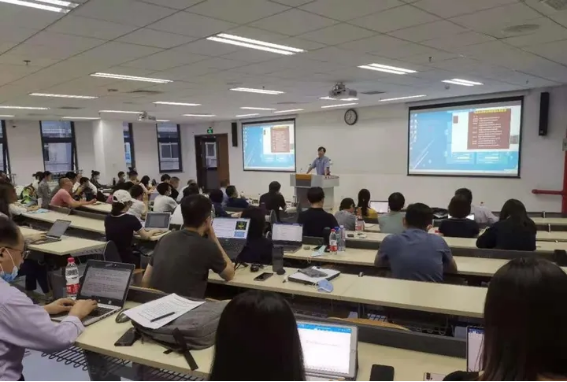
Pictured: Salon site
At 18:30 on the evening of June 28, this salon was officially held. Guo Lixin, Deputy Director of the Law and Policy Research Office of the Supreme People's Procuratorate, Li Linjun, Vice President of the China Association of Certified Tax Agents, Chen Ruihua, Professor of Peking University Law School and Vice President of the China Criminal Procedure Law Research Association, Ruan Qilin, Professor of the School of Criminal Justice of China University of Political Science and Law and Executive Director of the China Criminal Law Research Association, Shi Zhengwen, Professor of the School of Civil, Commercial and Economic Law of China University of Political Science and Law and Vice President of the Finance and Taxation Law Research Association of the China Law Society, Liu Tianyong, Director of Beijing Hwuason Law Firm and Director of the Finance and Taxation Law Professional Committee of the All China Lawyers Association, Qian Lieyang, director of Beijing Zihua Law Firm, and Wu Jinmei, partner of Beijing Yingke Law Firm and member of the Corporate Law Committee of the All-China Lawyers Association, delivered speeches successively. Professor Shi Zhengwen presided over this salon.
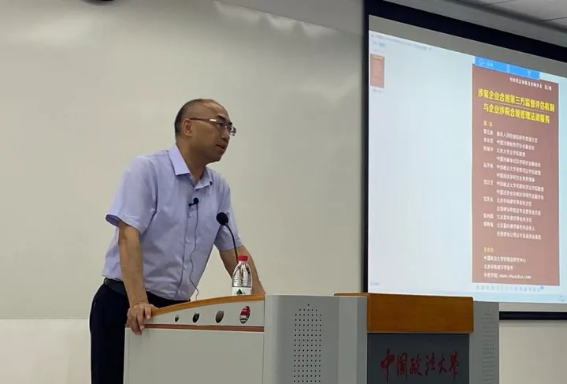
Pictured: Deputy Director Guo Lixin's speech
Guo Lixin, deputy director of the Law and Policy Research Office of the Supreme People's Procuratorate, first gave a detailed introduction to the overall design, guiding ideology and pilot situation of the "Third-party Supervision and Evaluation Mechanism for Compliance of Enterprises Involved in Cases". He pointed out that under the guidance of the Party Central Committee's policy of protecting private enterprises and the spirit of General Secretary Xi Jinping's important speech on protecting private entrepreneurs, the judicial organs should effectively combine the application of the law with the protection of enterprises, not only crack down on crime but also protect the legitimate rights of private enterprises. He pointed out that the purpose of the third-party compliance mechanism is not to relax, but to strictly regulate and ensure that the love given by the judiciary to private enterprises is not abused. He believes that the current compliance third-party mechanism needs to solve the main problem of "who supervises and how to supervise", and introduced three regulatory models, but believes that there are shortcomings in the models, such as "lack of energy and limited funds", "administrative organ law 'cannot do anything without authorization', unwilling to assume regulatory responsibilities", and "conflict between criminal investigation power and supervision power". In summary, he put forward the essence of the 16-character compliance third-party mechanism, that is, "procuratorial leadership, multi-party participation, objectivity and neutrality, and strengthened supervision". Finally, he introduced to everyone that the next step of the Supreme People's Procuratorate's work will focus on promoting the compliance third-party mechanism in accordance with the law, and the eight departments will jointly establish a third-party mechanism management committee to strengthen relevant supporting theoretical research.
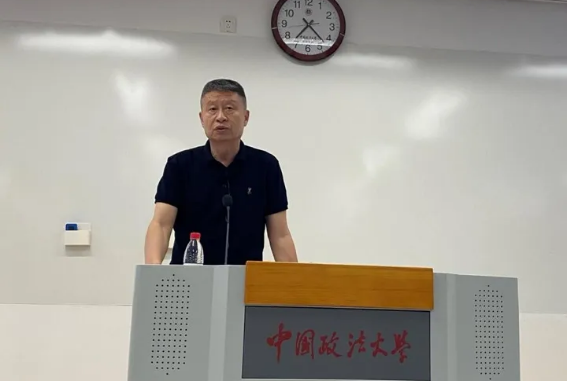
Pictured: Vice President Li Linjun's speech
Subsequently, Li Linjun, vice president of the China Certified Tax Agents Association, delivered a speech on behalf of the association. He pointed out that the "third-party supervision and evaluation mechanism for compliance of enterprises involved in cases" is of great significance, which is a concentrated embodiment of Xi Jinping's thought on the rule of law with the people as the main body, the need to further optimize the business environment, the implementation of the "six stability" and "six guarantees", an important measure to protect market entities, employment and people's livelihood, and a useful exploration for the reform of the national judicial system. He believes that the tax agent industry should actively participate in the compliance third-party mechanism, which is the trust, affirmation and recognition of the tax agent industry expressed by the Party Central Committee and the State Council, which is in line with the direction of the development of the tax agent industry. Finally, he believes that the promotion of the third-party compliance mechanism requires multi-party cooperation, and the urgent issues to be solved, such as how to select third-party experts, how to standardize compliance risk prevention reports, and the improvement of the final compliance third-party system, all require close cooperation between judicial authorities, administrative agencies, third parties, and enterprises.

Figure: Prof. Chen Ruihua's Lecture
Professor Chen Ruihua gave an in-depth interpretation of the "Third-party Supervision and Evaluation Mechanism for the Compliance of Enterprises Involved in Cases" from the perspective of criminal justice. He pointed out that there are three "favorable conditions at the right time, the right place and the right people" for the introduction of the third-party compliance mechanism: first, the policy background of the CPC Central Committee and the State Council to protect private enterprises and private entrepreneurs; Second, a large number of enterprises in China lack supervision in the growth stage, so that enterprises still carry criminal genes after growth, and only by decriminalizing enterprises and removing criminal genes can they promote the sustainable development of enterprises; Third, the procuratorate has opened "another window" to participate in social governance through "public interest litigation", and now it is participating in social governance again through the compliance third-party mechanism, representing the public interest. Subsequently, he vividly explained the U.S. experience of corporate compliance governance with the case of Siemens bribery in the United States and the case of ZTE's violation of export control, and proposed that compliance is compliance based on risk management, and the life of compliance lies in risk prevention and control. He proposed that there are three characteristics of corporate compliance management of third parties. The first is professionalism, in which the third party of enterprise compliance management assists the procuratorial organs and administrative departments in supervising the compliance inspection of enterprises, establishing compliance systems, and making up for the lack of manpower and professionalism of the procuratorial organs and administrative departments with professional knowledge, experience, and skills. The second is independence, and the third party must not have any conflict of interest with the enterprise, so that the compliance supervision activities can have a high degree of credibility; The third is effectiveness, that is, whether it is the daily compliance construction of the enterprise or the compliance handling of crises, it is necessary to ensure the effectiveness of compliance. He believes that the corporate compliance system is complex, and it is necessary for various departments to cooperate in formulating compliance acceptance standards, such as tax compliance acceptance standards, environmental compliance acceptance standards, etc. Finally, he believes that the third-party mechanism for compliance has given rise to the emerging industry of compliance regulators, which is a huge opportunity for all parties.

Pictured: Prof. Ruan Qilin's speech
Professor Ruan Qilin analyzed the third-party compliance mechanism from the perspective of criminal law. He proposed that the implementation of the third-party mechanism for compliance is "Suntory", that is, the entrepreneur receives judicial protection and is convicted; Lawyers get the opportunity to get more business; The prosecuting authorities gain more power through the distribution of powers. He believes that the implementation of the third-party mechanism for compliance is in line with the spirit of the central government's protection of private enterprises, and coincides with the purpose of the criminal law to prevent crimes. He pointed out that there is a trend of nihilism in the current criminal law theory, and the division between unit crime and individual responsibility is unclear in judicial practice, and the compliance third-party mechanism will promote the reform of the theory of unit crime.
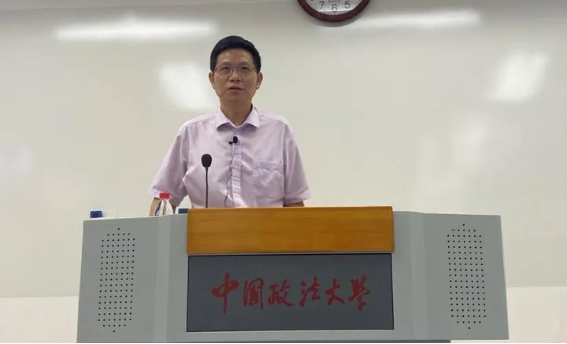
Figure: Prof. Shi Zhengwen's speech
Professor Shi Zhengwen then gave a speech on "Several Tax Law Issues in the Construction of Enterprise Compliance". He believes that the trend of China's tax law reform reflects the requirements of corporate compliance construction. Whether it is the 2015 Draft Amendment to the Tax Collection Administration Law (Draft for Comments) or the 2021 Administrative Penalty Law, the systems embodied in the correction declaration, advance ruling, remedial measures, reconciliation in the administrative reconsideration procedure, mediation and voluntary tax disclosure provide basic legal support for the subsequent construction of corporate tax compliance, and step by step to the edge of tax compliance construction. He proposed that in the process of promoting the construction of corporate tax compliance, we should pay attention to three key points of tax law theory: one is to adhere to the basic principles of tax law such as the principle of tax legality, the principle of tax fairness, and the principle of trust and cooperation, the second is to insist on protecting the rights of taxpayers, and the third is to realize the function of tax collection from the people, for the people, and for the benefit of the people. He believes that there are many problems at the institutional level and practical level in China's tax collection and management, one is the high statutory tax burden, the second is to increase the burden on taxpayers with the tradition of ticket control tax collection and management, the third is the administrative punishment is too heavy, and the criminal responsibility for false issuance is severe, the fourth is that the tax relief channels are not smooth, and the fifth is the selective law enforcement by the tax authorities. Finally, he put forward the basic idea of establishing enterprise tax compliance construction in China: first, legislation first, accelerate the revision of the tax collection and management law, and establish a modern tax collection and management system; The second is to establish a compliance system for corporate tax administrative supervision, improve compliance with tax laws, realize the transformation of "tax control by tickets" to "tax governance by numbers", establish and improve a new regulatory mechanism based on "credit + risk", and change from after-crackdown to pre-event prevention, and third, establish a criminal compliance system for corporate taxation; Fourth, establish an enterprise tax compliance organization and operation system.

Pictured: Director Liu Tianyong's speech
Director Liu Tianyong delivered a speech on the topic of "How Tax Lawyers Can Play a Role in the Third-Party Compliance Mechanism". Combined with the actual situation of a large number of false opening and tax fraud cases he has represented recently, he pointed out that the current judicial authorities have different adjudication standards for tax-related issues in certain industries, which is easy to cause judicial confusion in the industry. In cases of suspected false invoicing, there are also cases where the public security organs rely too much on the opinions of the tax authorities and use the opinions of the tax authorities on whether the case is guilty as evidence, which violates the basic principle of "criminal priority" in cases of false invoicing and tax fraud, and undermines the credibility and authority of the judiciary. Subsequently, he explained the possible limitations of the implementation of the compliance third-party mechanism from the application conditions of the mechanism: first, the application of the compliance third-party mechanism requires a plea of guilt and acceptance of punishment, for enterprises with entity operations, there is a truthful act of opening on behalf of the company and the amount is huge, and it is believed that the industry practice does not constitute a crime and is unwilling to admit guilt and accept punishment, while the shell violence falsely opens the enterprise itself is responsible for the crime and is willing to admit guilt and accept punishment, which reduces the effectiveness of the compliance third-party mechanism; Second, ascertaining the facts is the foundation, and crimes and non-crimes should not be confused for the purpose of applying the third-party mechanism for compliance, which undermines the fairness and justice of the criminal law. Finally, he looked forward to the future implementation of the compliance third-party mechanism from the perspective of daily administrative compliance, daily criminal compliance, and compliance in case handling.
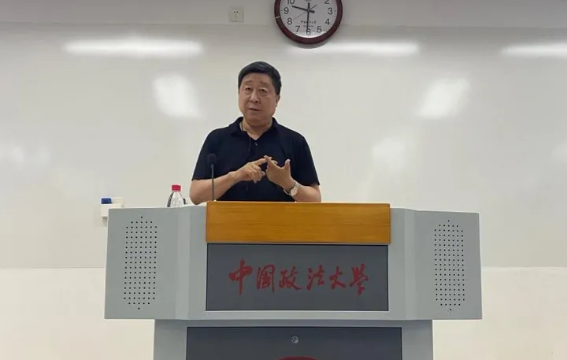
Pictured: Director Qian Leyang's speech
Director Qian Lieyang interprets the compliance third-party mechanism from the perspective of small and medium-sized private enterprises. He raised three issues that need to be addressed urgently: First, when enterprises apply the compliance third-party mechanism, will they still be held accountable? Second, what are the standards for compliance with different offences? Third, how to resolve conflicts of interest in the business of large law firms? He believes that only by solving the above problems can the compliance third-party mechanism achieve its function and purpose.
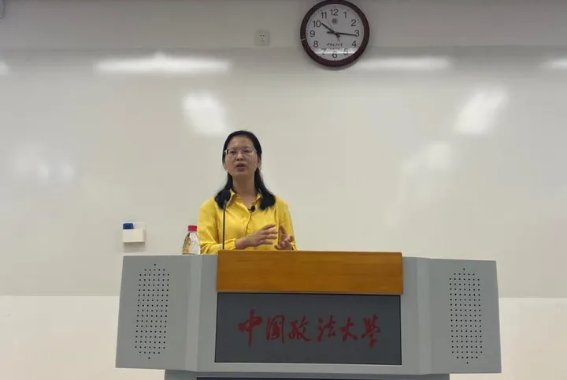
Pictured: Mr. Wu Jinmei's speech
Ms. Wu Jinmei analyzed the necessity of introducing a compliance third-party mechanism from the perspective of corporate governance. She pointed out that the inconsistency of civil and commercial law, accounting and tax law standards has caused the risk of corporate compliance errors, which needs to be resolved by legislation. At the same time, she pointed out the need to establish a segregation system from the corporate governance level to distinguish individual responsibility from corporate responsibility.
Finally, Professor Shi Zhengwen made a concluding speech. He pointed out that the construction of corporate compliance discussed in today's salon is the need for the future of the country's judicial reform, the need for the development of national legal theory, and the need for the further expansion of lawyers' business, and he is very grateful to the Supreme People's Procuratorate for promoting the implementation of the third-party compliance mechanism. He believes that the issues discussed in a comprehensive and in-depth manner in this salon are the frontier issues in the study of fiscal and taxation rule of law, and it is of great significance to promote the resolution of important issues in the third-party mechanism of compliance. Finally, he expressed his heartfelt thanks to all the guests, on-site and online audiences for their support.
At 10:20 p.m., the salon came to a successful conclusion. This issue of the salon highlights the characteristics of cutting-edge, professional and practical, and provides many references for in-depth research on the current dynamic trend of tax-related crimes, hot and difficult issues in case handling, helping lawyers, tax agents and financial and taxation workers to better participate in the construction of third-party mechanisms, safeguarding the legitimate rights and interests of enterprises and business managers, effectively punishing and preventing enterprise-related tax violations and crimes, and serving to ensure high-quality economic and social development. In the future, the China Tax Law and Tax Lawyers Salon will continue to pay attention to key issues in the field of fiscal and taxation law, and take it as its mission to explore major frontier topics in the construction of China's tax rule of law in the new era, and help the reform of the national fiscal and taxation system and the construction of fiscal and taxation rule of law!





